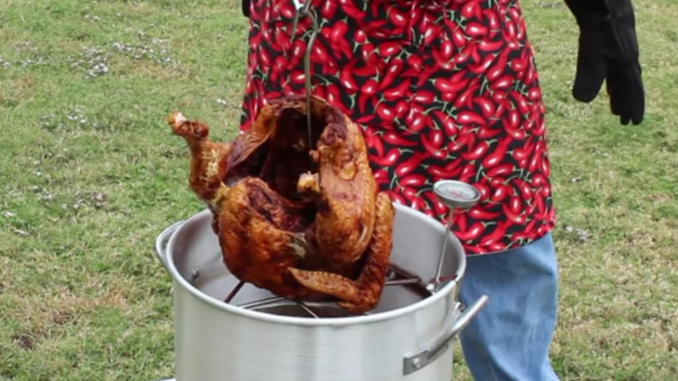
Three months ago, the Owl published an article expounding on the wonders of Crystallized Cottonseed Oil, which prompted a request from a voter in Georgia for a “follow up article on the uses of peanut oil”. Mr. G. A. Voter (gee, a voter? – we suspect this is quite possibly a psuedonym) added the gratuitous qualifier, “especially for deep frying turkeys”. The Owl was hesitant to honor this request because the very idea of frying a large bird of any kind in a pot of hot peanut oil causes his tail feathers to shake involuntarily. Nevertheless, this Owl is willing to risk life and wing for blogging glory and internet chicks clicks.
Peanut oil is used widely in cooking and food preparation, skin care and baby care products, and as an ingredient in medicines/pharmaceuticals. Regarding the many uses of peanut oil, let it be noted that there are numerous claims of health benefits and efficacies of peanut oil. Some common claims are that it; lowers blood pressure, lowers cholesterol, prevents heart disease as well as cancer and “cognitive disorders”, can be applied topically for treatment of arthritis, joint pain, and a variety of skin conditions, boosts the immune system, and it is also used to relieve constipation, WebMD throws cold water on many of these claims, pointing out that there is insufficient evidence to support them. Notice that WebMD does not say the health benefit claims are false, only that there is not enough scientific evidence.
Peanut oil is also claimed to be a suitable substitute for engine oil in the common suburban lawnmower, but what that has to do with health benefit claims is beyond this Owl’s ken.
Peanut oil is high in monounsaturated “good” fat and low in saturated “bad” fat, which is believed to help prevent heart disease and lower cholesterol. Most studies in animals suggest that peanut oil might help to reduce fatty build up in blood vessels. However, not all studies agree.
WebMD
No article on peanut oil could be complete without mentioning the efforts and accomplishments of Dr. George Washington Carver. In addition to his scientific achievements, he created some 300 uses from peanuts including cooking oil, salad oil, rubbing oil, hair and scalp oil, soap, shampoo, lubricating oil, illuminating oil, and a medicinal oil similar to castor oil.
Many people are allergic to peanuts and peanut oil. Due to the similarity between allergies caused by peanuts and certain tree nuts, peanuts are sometimes listed with tree nuts, although they are actually legumes.
When cooking with peanut oil, you should be aware of its smoke point, that is, the temperature at which the oil begins to break down. You don’t want the oil to reach this temperature. The good news is, peanut oil is a popular choice when cooking because food is prepared at temps lower than the smoke point. Refined peanut oil has a smoke point of 232°C (450°F). Unrefined peanut oil has a smoke point of 160°C (320°F).
A major corporate name associated with Thanksgiving turkeys has published online step-by-step instructions describing How To Deep Fry A Turkey featuring both indoor and outdoor approaches to the culinary art.
There are numerous videos available online that demonstrate how to deep fry a turkey, both correctly and incorrectly. Note that, every year, thousands of people deep fry their turkey incorrectly, and burn their homes down. Important safety tips: hot oil and water are dangerous together, so (1) never deep fry a frozen turkey, make sure it is completely thawed first, (2) thoroughly remove all water moisture from the turkey with paper towels, and let it air dry in the fridge overnight before deep frying, and (3) “don’t cross the streams”.
“This is why you should NEVER deep fry a frozen turkey” (1:04):
The right way: “How to Deep Fry a Turkey | Art of Manliness” (15:22):
Question of the Night: How do you plan to celebrate Thanksgiving this year (even if it is still almost four months away)?
